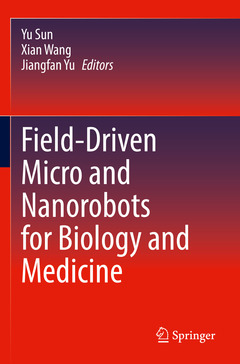Description
Field-Driven Micro and Nanorobots for Biology and Medicine, 1st ed. 2022
Coordinators: Sun Yu, Wang Xian, Yu Jiangfan
Language: English
Subjects for Field-Driven Micro and Nanorobots for Biology and Medicine:
Keywords
Robotic cell sorting; Micro robotics; Nanorobotics; Bio-hybrid robots; Mechanical stimulation on cell and tissues; Robotic propulsion; Small-scale robotics; Mechanical characterization on biological samples; Tissue engineering applications; Disease diagnoses; Minimally invasive surgery; Robotics
Publication date: 11-2022
421 p. · 15.5x23.5 cm · Paperback
Publication date: 11-2021
421 p. · 15.5x23.5 cm · Hardback
Description
/li>Contents
/li>Biography
/li>Comment
/li>
This book describes the substantial progress recently made in the development of micro and nanorobotic systems, utilizing magnetic, optical, acoustic, electrical, and other actuation fields. It covers several areas of micro and nanorobotics including robotics, materials science, and biomedical engineering. Field-Driven Micro and Nanorobots for Biology and Medicine provides readers with fundamental physics at the micro and nano scales, state-of-the-art technical advances in field-driven micro and nanorobots, and applications in biological and biomedical disciplines.
Yu Sun is a member of two national academies of Canada (Canadian Academy of Engineering; Academy of Science of the Royal Society of Canada). He is a Tier I Canada Research Chair and the Director of the University of Toronto’s Robotics Institute. His Advanced Micro and Nanosystems Laboratory specializes in developing innovative technologies and instruments for manipulating and characterizing cells, molecules, and nanomaterials. He was elected Fellow of the ASME (American Society of Mechanical Engineers), IEEE, AAAS (American Association for the Advancement of Science), National Academy of Inventors (USA), and AIMBE (American Institute of Medicine and Biomedical Engineering (AIMBE) for his work on micro-nano devices and robotic systems. Among the awards he received were an NSERC E.W.R. Steacie Memorial Fellowship, an NSERC Synergy Award for Innovation, the McLean Award, and the IEEE C.C. Gotlieb Computer Award.
Xian Wang is a research fellow at the Hospital for Sick Children in Toronto. He received a B.S. degree in Engineering from Tianjin University in 2015 and his Ph.D. degree from the University of Toronto in the collaborative Ph.D. program in Mechanical Engineering and Biomedical Engineering in 2020. He has published more than 20 peer-reviewed papers in international journals, including Science Robotics, Nature Communications, PNAS, IEEE Transactions on Robotics, Biophysical Journal, and Journal of Cell Science. He received the Best Paper Award on Automation at the 2019 IEEE International Conference on Robotics and Automation (ICRA), and the Best Poster Presentation at the 2018 and 2019 University of Toronto MIE Symposiums. He has been awarded a Lap-Chee Tsui Fellowship, Ontario Graduate Fellowship and Mitacs Graduate Fellowship in Canada, a National Scholarship in China, and Milligan Graduate Fellowship at the University of Toronto.
Jiangfan Yu is an Assista
Describes state-of-the-art field-driven micro and nanorobotic technologies
Covers physical principles for designing micro and nanorobots
Provides examples of micro and nanorobotic systems and biomedical and clinical applications




